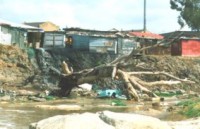By Will Alexander, Memo to African Scientists, 20 January, 2009

I took this photograph in Alexandra Township. The flimsy shacks are built on an old refuse dump that is now being eroded away by the river. A large tree has already collapsed into the river. The wreckage of a Volkswagen Beetle had its roof stripped off to be used for the construction of a shack. The Jukskei River in the foreground is the most polluted river in South Africa. This is because of the complete lack of sanitation facilities in the shacks along its banks. This Township is less than 20 km from the summit venue.
How dare our Ministry of Environmental Affairs and Tourism hold an expensive four-day summit on climate change, attended by 600 delegates, when thousands of people are living in abject poverty within 20 minutes driving distance from Midrand?
I have been involved in searching for solutions to these difficult sociological problems for more than 15 years. Resulting from my work in Alexandra, I was appointed by the United Nations Secretary-General as a member of the United Nations Scientific and Technical Committee on Natural Disasters. This United Nations body functioned at the same time as another United Nations body the United Nations Framework Convention on Climate Change (UNFCCC).
However, there was no communication between the two bodies. This was for the simple reason that our studies demonstrated without doubt that increases in the loss of life from natural disasters were due to growing human populations and forced occupation of areas exposed to floods and droughts. The photograph above is an example.
Our thorough studies demonstrated that there was no evidence of increases in the frequency or magnitude of floods and droughts. This is not what the UNFCCC wanted to hear.
The Intergovernmental Panel on Climate Change (IPCC) was established in 1988 by two high level international agencies. These were the World Meteorological Organisation (WMO), and the United Nations Environment Programme (UNEP). It has produced several assessment reports at roughly five-yearly intervals. The latest was issued in 2007. From the beginning, the approach adopted by the IPCC was directly contrary to the recommendations of other United Nations bodies. The claims of increases in floods and droughts have no substance. Read more here.




